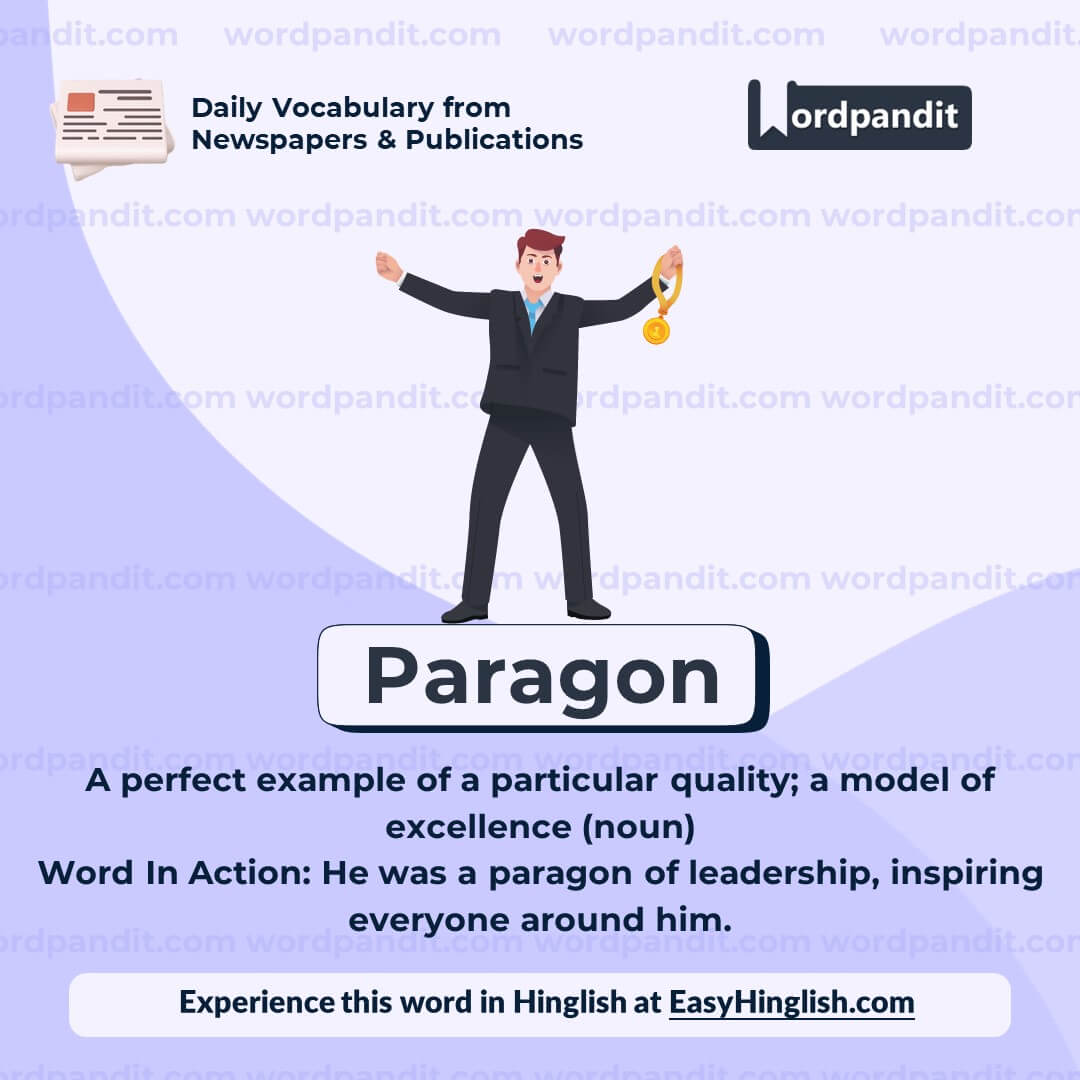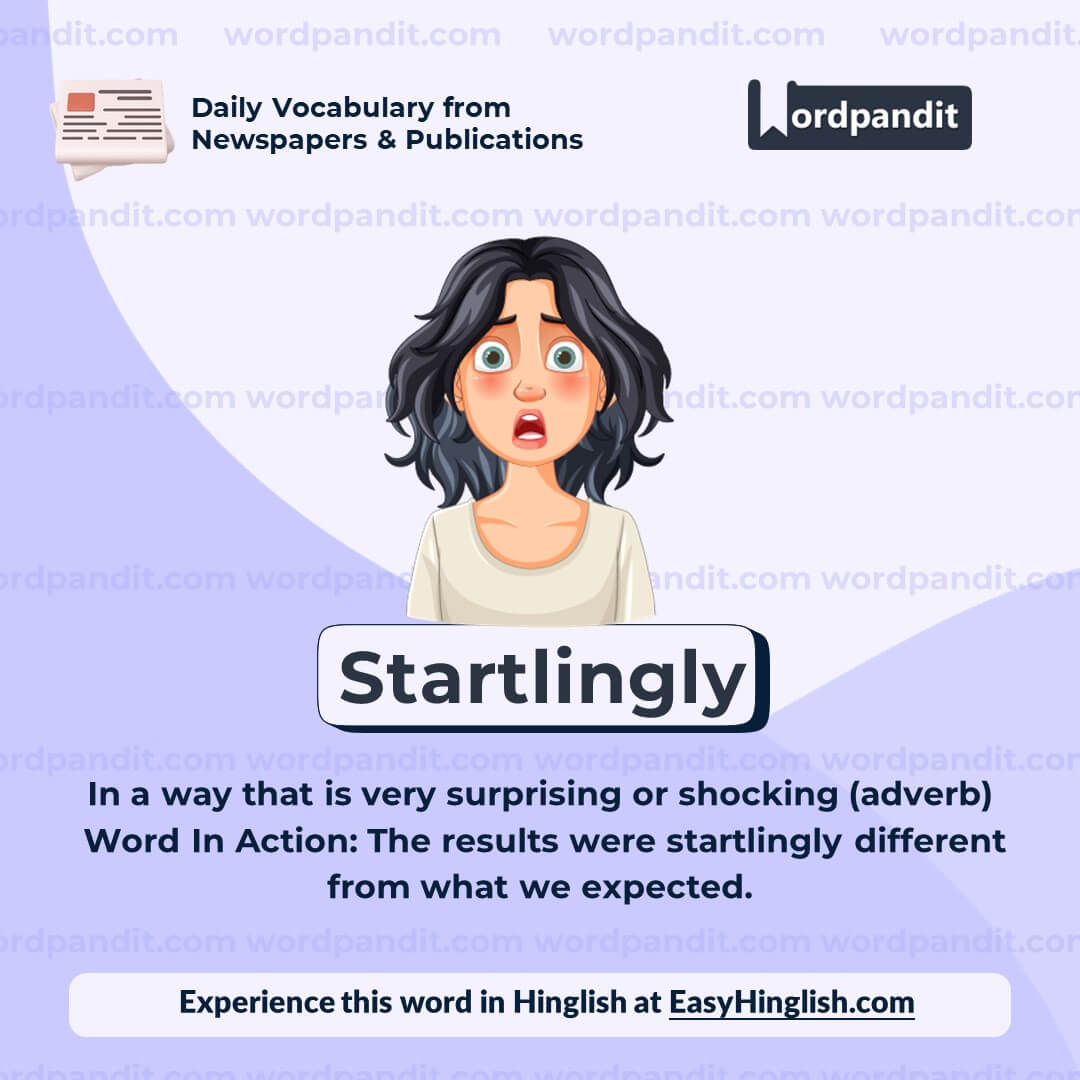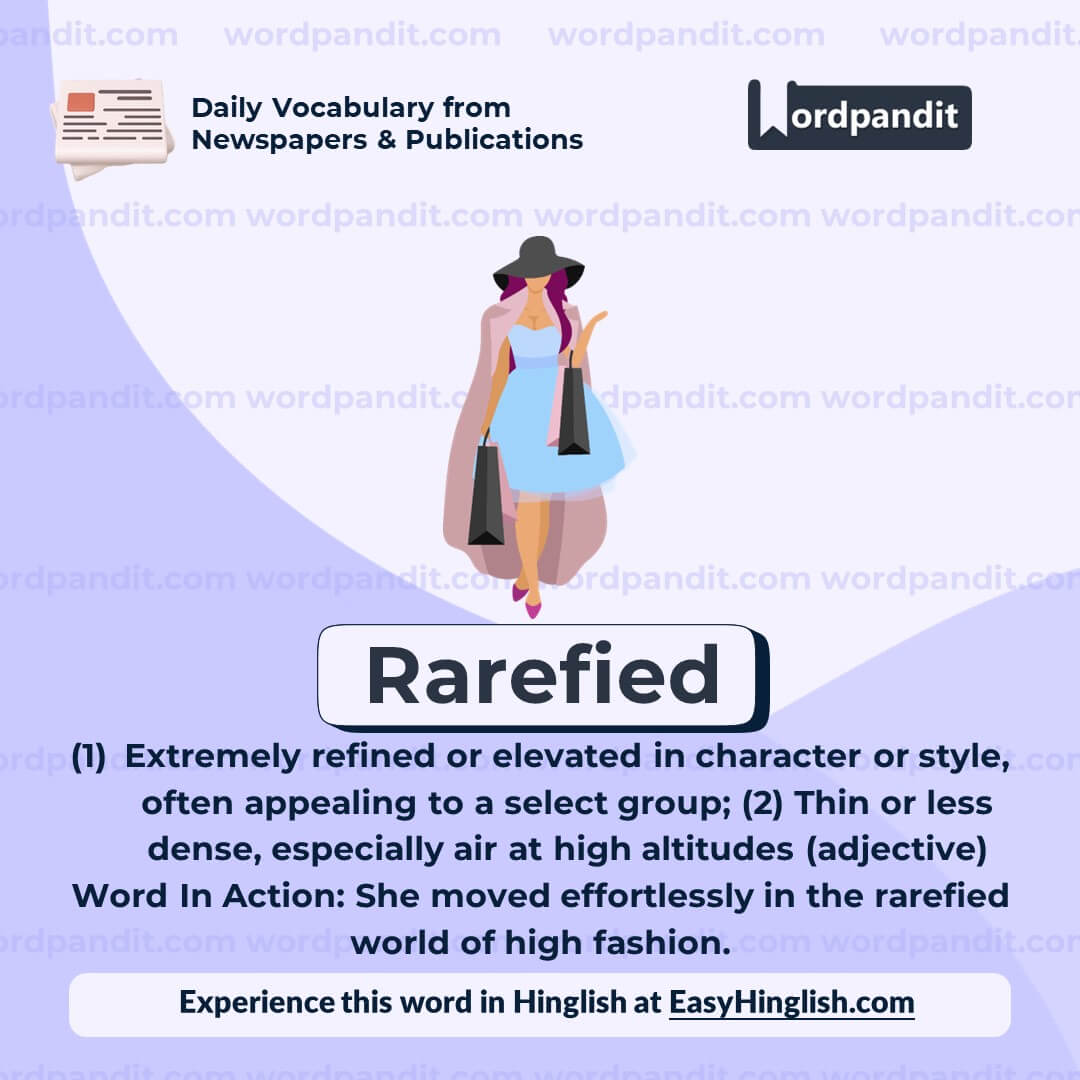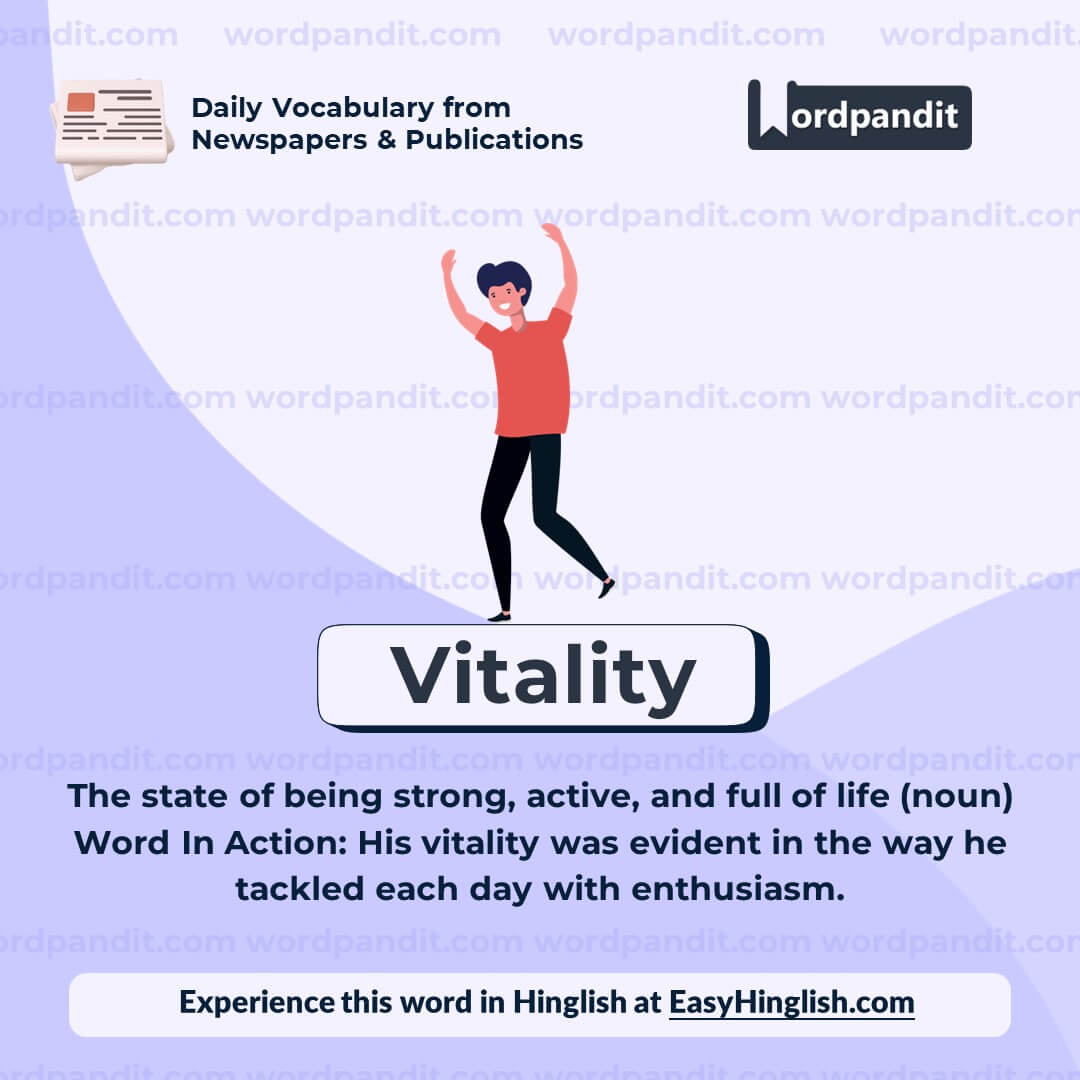Daily Vocabulary from International Newspapers and Publications
Expand Your Vocabulary with Wordpandit’s Global Vocabulary Hub
At Wordpandit, we are committed to helping you develop a truly global vocabulary by drawing from some of the most respected international publications. This section is designed to keep you ahead of the curve by introducing you to words that define global conversations and trends.
The Power of Global Sources
To help you think and communicate on a global scale, we curate vocabulary from renowned international sources, such as:
- The New York Times
- The Washington Post
- BBC
- The Guardian
- The Economist
- Scientific American
- Psychology Today
- And many more...
Stay Global, Stay Competitive
Our daily updates from international publications ensure you are consistently exposed to new words that reflect global news and developments, making sure your vocabulary is not only current but also globally relevant.
Enhance Your Global Perspective
Whether you’re preparing for international exams, aiming to excel in global business communication, or want to enhance your language skills for personal growth, Wordpandit offers the resources you need to thrive in a global context.
Effective Learning, Global Reach
Our learning methodology combines global examples, memory aids, and interactive activities, allowing you to internalize new words effectively and apply them in real-world scenarios.
Begin Your Global Vocabulary Journey Now!
Why Choose Wordpandit?
Practical Learning: Focus on words you'll actually encounter in real-world reading, enhancing your comprehension and communication skills.
Diverse Content: From current affairs to scientific breakthroughs, our varied sources expose you to vocabulary across multiple domains.
Effortless Integration: Make Wordpandit a part of your daily routine. Just a few minutes each day can significantly boost your lexicon over time.
Your Path to Vocabulary Mastery
- Visit our Daily Vocabulary section regularly
- Explore new words and their usage in context
- Practice incorporating these words into your own writing and speech
- Track your progress as your vocabulary expands
Start Your Journey Today
Embark on your vocabulary enhancement journey with Wordpandit. By consistently engaging with our daily posts, you'll build a robust vocabulary that serves you well in academic, professional, and personal contexts.
Remember, a word a day keeps linguistic limitations at bay. Make Wordpandit your daily companion in the quest for vocabulary excellence!
WORD-1: Paragon
Context:
"The world sees Japan as a paragon of minimalism. But its hidden clutter culture shows that ‘more’ can be as magical as ‘less.’" - Aeon
Explanatory Paragraph:
The word "paragon" refers to someone or something that is regarded as the perfect example or model of excellence in a particular quality. It highlights a standard of perfection that others aspire to reach. In the given context, Japan is described as a paragon of minimalism, meaning it is widely recognized as an ideal example of this lifestyle.
Meaning: A perfect example of a particular quality; a model of excellence (noun)
Pronunciation: PAIR-uh-gon
Difficulty Level: ⭐⭐⭐ Intermediate
Etymology: Originating from the late Middle English, derived from the Italian word "paragone," which means 'touchstone used to test gold purity,' and further from the Greek "parakonan," meaning 'to sharpen.'
Synonyms & Antonyms:
Synonyms: Exemplar, model, ideal, archetype
Antonyms: Imperfection, flaw, defect, shortcoming
Usage Examples:
- The athlete was considered a paragon of determination and discipline by her peers.
- The chef's latest creation was a paragon of culinary innovation.
- Her kindness and empathy made her a paragon of virtue in the community.
- The building, with its sleek design and sustainable features, is hailed as a paragon of modern architecture.
Cultural Reference:
"In ancient literature, Achilles is often portrayed as a paragon of strength and bravery, embodying the qualities of a heroic warrior." - Mythological Studies
Think About It:
Can striving to be a paragon in any field sometimes lead to undue pressure or unrealistic expectations? Why or why not?
Quick Activity:
Write a short paragraph describing a person or concept you consider to be a paragon in your life. Explain why they deserve this title.
Memory Tip:
Imagine a “pair” (PAIR-uh-gon) of golden crowns to remember "paragon" as a perfect example of excellence or royalty.
Real-World Application:
The term "paragon" is often used in professional environments to describe individuals or projects that set a benchmark for quality, such as a paragon of customer service in a business context.
WORD-2: Startlingly
Context:
"looked startlingly unlike the rarefied minimalism that the world had come to expect from Japan. Tsuzuki’s photos were a joyous declaration to the contrary, celebrating the vitality of living spaces filled with wall-to-wall clutter." - Aeon
Explanatory Paragraph:
The word "startlingly" is an adverb used to describe something that is extremely surprising, shocking, or striking, often in an unexpected way. It emphasizes the intensity or unexpectedness of the quality being described. In the context provided, the cluttered living spaces appeared shockingly different from the minimalist image associated with Japan.
Meaning: In a way that is very surprising or shocking (adverb)
Pronunciation: START-ling-lee
Difficulty Level: ⭐⭐ Beginner
Etymology: Derived from the verb "startle," which originated in Middle English, from Old English "styrtan" meaning 'to jump up' or 'to leap.' The suffix "-ly" turns it into an adverb.
Synonyms & Antonyms:
Synonyms: Shockingly, surprisingly, strikingly, dramatically
Antonyms: Expectedly, unsurprisingly, predictably, calmly
Usage Examples:
- The painting was startlingly realistic, capturing every detail with precision.
- She looked startlingly different after her makeover, leaving everyone speechless.
- The proposal was startlingly bold, challenging all the established norms.
- Startlingly, the quiet student emerged as the best speaker during the debate.
Cultural Reference:
"The films of Alfred Hitchcock are often described as startlingly innovative, blending suspense and psychological depth in a way that transformed cinema." - Film Studies Journal
Think About It:
Why do you think "startlingly" is often used to describe contrasts or unexpected elements? Can such surprises make narratives more engaging?
Quick Activity:
Write a sentence using "startlingly" to describe a surprising moment or realization you’ve experienced.
Memory Tip:
Link "startlingly" to the word "startle"—imagine a sudden jump or reaction to something shocking, and you'll remember its meaning.
Real-World Application:
The word "startlingly" is often used in journalism, reviews, and creative writing to emphasize contrasts or surprises, making descriptions more vivid and engaging for the audience.
WORD-3: Rarefied
Context:
"looked startlingly unlike the rarefied minimalism that the world had come to expect from Japan. Tsuzuki’s photos were a joyous declaration to the contrary, celebrating the vitality of living spaces filled with wall-to-wall clutter." - Aeon
Explanatory Paragraph:
The word "rarefied" refers to something that is highly refined, elevated, or exclusive, often appealing to a select or elite group. It can also describe something that is thin or less dense, such as air at high altitudes. In the provided context, "rarefied minimalism" describes a sophisticated, almost unattainable standard of minimalistic design that Japan is often associated with.
Meaning: (1) Extremely refined or elevated in character or style, often appealing to a select group; (2) Thin or less dense, especially air at high altitudes (adjective)
Pronunciation: RARE-uh-fied
Difficulty Level: ⭐⭐⭐ Intermediate
Etymology: Derived from the Latin "rarefacere," meaning 'to make rare,' composed of "rarus" (rare) and "facere" (to make).
Synonyms & Antonyms:
Synonyms: Refined, elevated, exclusive, esoteric, exalted
Antonyms: Common, ordinary, dense, accessible, mainstream
Usage Examples:
- The rarefied atmosphere of the private club attracted only the most affluent members.
- Her rarefied taste in art made her home gallery a haven for connoisseurs.
- The rarefied air at the mountain summit made it difficult for climbers to breathe.
- The novel explores the rarefied world of academia, where ideas often seem detached from everyday life.
Cultural Reference:
"The rarefied beauty of Audrey Hepburn's style in the film 'Breakfast at Tiffany's' continues to set a high standard for timeless elegance." - Classic Film Studies
Think About It:
Is it important for rarefied ideas or lifestyles to remain exclusive, or should they be made more accessible to everyone? Why?
Quick Activity:
Write a sentence using "rarefied" to describe a place, concept, or object that you associate with high refinement or exclusivity.
Memory Tip:
Imagine "rare" in "rarefied" to think of something rare, refined, and exclusive, like rare jewels or rare air at mountain peaks.
Real-World Application:
The term "rarefied" is commonly used in discussions about art, culture, and high society, as well as in scientific contexts to describe thin air or low-pressure environments.
WORD-4: Vitality
Context:
"looked startlingly unlike the rarefied minimalism that the world had come to expect from Japan. Tsuzuki’s photos were a joyous declaration to the contrary, celebrating the vitality of living spaces filled with wall-to-wall clutter." - Aeon
Explanatory Paragraph:
The word "vitality" refers to the state of being full of energy and life. It conveys an active, spirited, and thriving essence, whether it pertains to a person's physical energy, a community's dynamism, or the vibrancy of a concept or space.
Meaning: The state of being strong, active, and full of life (noun)
Pronunciation: vai-TAL-uh-tee
Difficulty Level: ⭐⭐⭐ Intermediate
Etymology: Derived from the Latin word "vitalis," meaning "of life" or "life-giving."
Synonyms & Antonyms:
Synonyms: energy, liveliness, vigor, exuberance, dynamism
Antonyms: lethargy, sluggishness, apathy, inactivity
Usage Examples:
- The vitality of the garden was evident in its colorful blooms and buzzing bees.
- Her vitality and enthusiasm for the project inspired everyone in the team.
- The city’s nightlife is full of vitality, attracting visitors from all over the world.
- Regular exercise and a balanced diet are key to maintaining one's vitality.
Cultural Reference:
"Vitality is often celebrated in art and culture as a symbol of resilience and life. For example, Van Gogh’s paintings, with their swirling colors and dynamic strokes, convey the vitality of nature and human emotion." - Art History Journals
Think About It:
How does the vitality of a person or place influence those around them?
Quick Activity:
Write a short paragraph describing a place you’ve visited that was full of vitality. Highlight specific details that made it feel lively.
Memory Tip:
Link "vitality" with "vital," as they share the same root. If something is vital, it’s full of life or essential to life.
Real-World Application:
In professional settings, demonstrating vitality through a positive attitude and energy can greatly enhance team dynamics and productivity.
WORD-5: Facade
Context:
"But Tsuzuki peeled away this façade to reveal a more complicated side to his nation. And Tokyo was the perfect setting for this exfoliation." - Aeon
Explanatory Paragraph:
The word "facade" can refer to the front or face of a building, typically the most ornate or visible side. Figuratively, it is used to describe a deceptive outward appearance meant to hide true feelings, situations, or realities.
Meaning: The front of a building, or a false, superficial, or artificial appearance (noun)
Pronunciation: fuh-SAHD
Difficulty Level: ⭐⭐⭐ Intermediate
Etymology: Borrowed from French "façade," from Italian "facciata," from "faccia," meaning "face."
Synonyms & Antonyms:
Synonyms: front, veneer, mask, disguise, pretense
Antonyms: reality, interior, authenticity, truth
Usage Examples:
- The building’s facade was decorated with intricate carvings and ornate windows.
- She maintained a facade of calmness, even though she was nervous inside.
- The politician’s friendly facade hid his manipulative intentions.
- The facade of the old house made it appear abandoned, but it was bustling with life inside.
Cultural Reference:
In literature, characters often use facades to hide their true intentions or emotions. For example, in "The Great Gatsby" by F. Scott Fitzgerald, Gatsby's luxurious lifestyle is a facade masking his deep longing and insecurities.
Think About It:
Why do people or societies create facades, and how do these facades impact relationships or perceptions?
Quick Activity:
Write a sentence using "facade" in both its literal and metaphorical meanings.
Memory Tip:
Think of a building's face when you hear "facade"—a "false face" can help you remember the metaphorical meaning.
Real-World Application:
Understanding facades is crucial in fields like architecture (designing building fronts) and psychology (analyzing behavior that hides true emotions or motives).


















